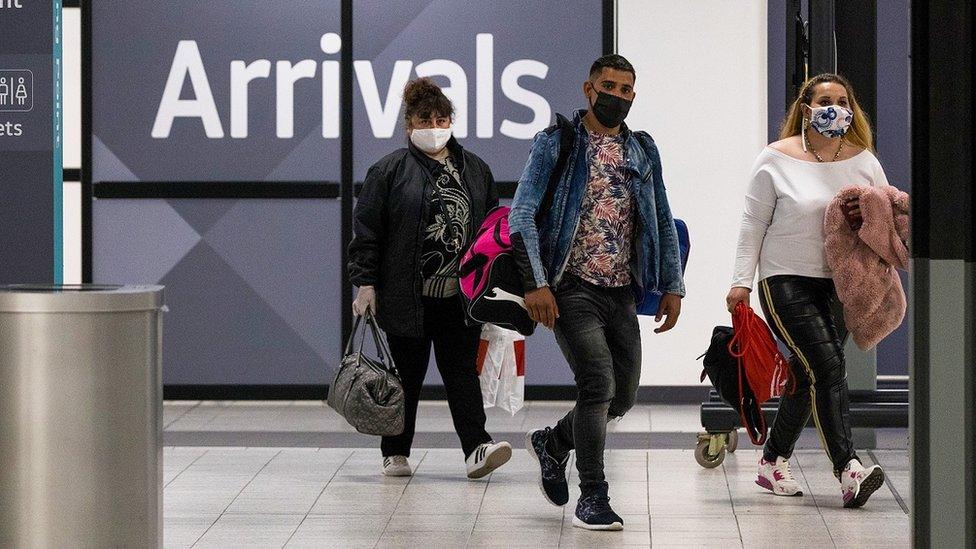Holiday firms in fresh plea over 2-week flight quarantine plans
- Published
- comments

A group of 200 travel companies has written to Home Secretary Priti Patel asking for current quarantine plans for people entering the UK to be scrapped.
It follows calls last week from MPs and travel bosses to reconsider the rules.
From 8 June, people entering the UK from abroad will be told to isolate for 14 days or face a fine.
The government insists the new rules will help keep the transmission rate of the virus down.
The letter suggests travel should be possible for people - without quarantine - between destinations "deemed safe from coronavirus".
So-called air bridges would allow visitors from countries where coronavirus infection rates are low into the UK, without having to self-isolate for two weeks.
The lead author of the letter, George Morgan-Grenville, boss of tour operator Red Savannah, said: "This is not just a group of company bosses complaining, but employees from bottom to top calling for the quarantine plans to be quashed."
A government spokesperson said: "These cross Government public health measures are designed to keep the transmission rate down, stop new cases being brought in from abroad and help prevent a devastating second wave of coronavirus. All of our decisions have been based on the latest scientific evidence.


The quarantine hasn't even taken effect, but from the word go, this policy has been under fire on several fronts.
Travel firms face bankruptcy. It could be the final nail in the coffin for some smaller firms.
UK aviation is shedding jobs and if the sector can't rebound to some extent this summer, the economic misery will only be compounded.
Senior figures within the Conservative party, like the former shadow home secretary David Davis, are vehemently opposed.
I'm told that the Transport Secretary, Grant Shapps, is not a fan either.
But Number 10 and the Home Office argue that as the prevalence of the virus falls in the UK, the effectiveness of a quarantine, to stop cases being imported, rises.
"Air bridges" - where two countries with relatively low infection rates agree to waive the quarantine measures - are possible.
Reports in the Portuguese media suggest an air bridge with Portugal is on the cards.
But when it comes to controlling the virus, the United Kingdom is behind other countries in Europe and so, in negotiations, the ball might not be in the UK's court.
The quarantine might prove irrelevant in some cases if governments such as those in Greece and Spain, as they have indicated, do not let British tourists in.

Other firms and travel bosses who have signed include hotelier Sir Rocco Forte, hotels The Ritz, The Connaught and Mandarin Oriental, and upmarket travel agent Kuoni.
Last month, in a letter to the prime minister, bosses of airlines such as EasyJet, Tui, Jet2 and Virgin Atlantic, as well as industry bodies Airlines UK, the British Chambers of Commerce, UK Hospitality and manufacturing association Make UK said that while they fully support the government's commitment to public health, they have "serious reservations" about a "blanket approach" to all arrivals into Britain.
Some travel firms have come under fire for their treatment of customers owed refunds as flights and holidays were cancelled amid the UK's lockdown.
The aviation watchdog last month warned airlines that they are legally required to provide refunds to customers who had their flights cancelled because of the coronavirus.
By law, plane operators must refund customers within seven days if their flight is cancelled.
The Civil Aviation Authority (CAA) said it could take action against airlines.
Airlines including Easyjet, British Airways, Virgin Atlantic and Ryanair have all announced thousands of job cuts.
Reviews planned
Passengers arriving in the UK by plane, ferry or train - including UK nationals - will have to provide an address where they will remain for 14 days. There is a £100 penalty for anyone found to have not filled in this ''contact locator'' form.
Surprise visits will be used to check they are following the rules. Those in England could be fined up to £1,000 if they fail to self-isolate, while governments in Scotland, Wales and Northern Ireland can also impose penalties.
Passengers will be asked to drive in their own car to their destination, where possible. If they do not provide an address, the government will arrange accommodation.
They must then not go to work, school, or public areas, or use public transport or taxis. They should also not have any visitors unless they are providing essential support, and should not go out to buy food or other essentials where they can rely on others.
The Home Office added: "The list of exemptions has been agreed by all government departments in consultation with their stakeholders which will ensure critical supplies and services can continue and will be kept under review.
"People coming into the UK will be required to provide contact and travel information, including those who are exempt. We will set out further detail shortly including on how we will take action against those who flout the rules."

VACCINE: How close are we to finding one?
SCHOOLS: When will children be returning?
EXERCISE: What are the guidelines on getting out?
THE R NUMBER: What it means and why it matters
GLOBAL SPREAD: Tracking the pandemic

- Published11 February 2022

- Published28 May 2020

- Published28 May 2020
